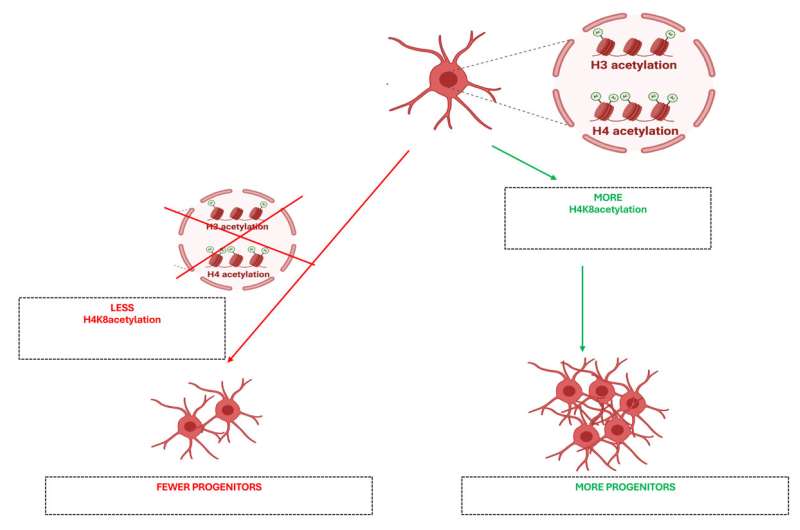This article has been reviewed according to Science X's editorial process and policies. Editors have highlighted the following attributes while ensuring the content's credibility:
fact-checked
peer-reviewed publication
trusted source
proofread
Study reveals unique histone tag in oligodendrocyte progenitor cells, opening doors for advanced myelin repair therapies

In a new study, researchers with the Advanced Science Research Center at the CUNY Graduate Center (CUNY ASRC) have identified a distinct histone tag in adult oligodendrocyte progenitor cells (OPCs) that may pave the way for innovative therapies targeting myelin repair, a critical target for several neurodegenerative and psychiatric disorders, including multiple sclerosis, Alzheimer's disease, and schizophrenia.
The histone tag, characterized by lysine 8 acetylation on histone H4, identifies a significant departure from the histone modifications found in neonatal OPCs.
Detailed in a paper published in The Journal of Cell Biology, the discovery of this unique histone tag in adult OPCs addresses a long-standing challenge in neurobiology: the inability to translate findings from neonatal OPCs to effective adult brain therapies.
Unlike their neonatal counterparts, adult OPCs exhibit a histone modification that appears to regulate their proliferation, a crucial factor for generating a pool of stem-like cells capable of developing into mature oligodendrocytes that produce new myelin—the protective sheath around nerve fibers that is often damaged in neurodegenerative and psychiatric diseases.
"The identification of this histone tag provides a clearer understanding of OPC proliferation in the adult brain, and it also holds promise for developing more effective therapies for conditions characterized by myelin damage like multiple sclerosis, Alzheimer's, and several psychiatric disorders," said the study's principal investigator Patrizia Casaccia, founding director of the CUNY ASRC Neuroscience Initiative and Einstein Professor of Biology and Biochemistry at the CUNY Graduate Center.
"By focusing on adult OPCs, we can move closer to repairing myelin damage and improving patient outcomes."
"Our findings underscore the importance of targeting adult-specific cellular mechanisms in neurotherapeutic research," said the paper's co-first author David K. Dansu, Ph.D., a former biochemistry doctoral student researcher with the CUNY ASRC Neuroscience Initiative.
"Our future investigations will aim to further elucidate the role of lysine 8 acetylation on histone H4 and explore its potential in clinical applications," said co-first author and Graduate Center biochemistry Ph.D. student Ipek Selcen, also with the CUNY ASRC Neuroscience Initiative.
More information: David Dansu et al, Histone H4 acetylation differentially modulates proliferation in adult oligodendrocyte progenitors, Journal of Cell Biology (2024). DOI: 10.1083/jcb.202308064



















